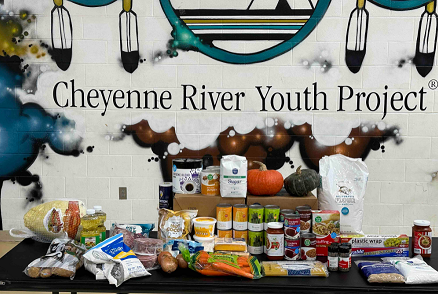
- Details
- By Native News Online Staff
The Cheyenne River Youth Project (CRYP), in collaboration with the Church of Jesus Christ of Latter-Day Saints, distributed 435 boxes of food to families on the Cheyenne River Sioux Reservation earlier this month.
CRYP Family Services members received their boxes on Nov. 9, and members of the general public received theirs on Nov. 10.
“This was so much more than a holiday meal,” said Julie Garreau, CRYP’s executive director. “Each box contained ingredients worth more than $250. One of our elders told us this food will help her get through the winter.”
Each family received items such as a whole turkey; ground beef, beef roast, and sliced ham; canned green beans, corn, spaghetti sauce, and pork-and-beans; fresh and instant potatoes, spaghetti noodles, stuffing mix, and rice; fresh squash, carrots and onions; canned pumpkin and cranberry sauce; cheddar cheese; white flour; brown, granulated, and powdered sugar; vegetable oil; butter; salt, black pepper, and cinnamon; hot cocoa, and powdered milk. The distribution also included household items such as plastic wrap and aluminum foil.
President Kevin White Bull of the Church of Jesus Christ’s Eagle Butte Branch expressed his gratitude for the November distribution. His wife, Sister Merrie White Bull, agreed; she is a Cheyenne River Sioux Tribal Council representative, and she has been a CRYP supporter since the youth project opened its doors in 1988.
“Everyone benefits from the services CRYP provides,” she explained. “Julie is compassionate and has a big heart. We are really proud the church has opened up a partnership with Julie to get food out to the people. The people appreciate it so much. CRYP is a wonderful program.”
“Julie and the Cheyenne River Youth Project are making a difference in the lives of young people and families in the Cheyenne River community,” said Stake President Steve Osmond, from the Bismarck North Dakota Stake of the Church of Jesus Christ. “They help them connect with each other and have life experiences that lift and empower them, and help them move toward a more vibrant and secure future.
“They are dedicated to the physical, emotional, mental and spiritual wellness of their participants,” he continued. “We are happy to support this work with a donation of quality food, specifically packaged to meet the needs of the community.”
More Stories Like This
Native News Weekly (August 25, 2024): D.C. BriefsUS Presidents in Their Own Words Concerning American Indians
Native News Weekly (January 18, 2026): D.C. Briefs
Federal Judge Orders ICE to Halt Use of Pepper Spray, Arrests of Peaceful Protesters in Twin Cities
Tunica-Biloxi Cultural Leader John D. Barbry Walks On
Help us defend tribal sovereignty.
At Native News Online, our mission is rooted in telling the stories that strengthen sovereignty and uplift Indigenous voices — not just at year’s end, but every single day.
Because of your generosity last year, we were able to keep our reporters on the ground in tribal communities, at national gatherings and in the halls of Congress — covering the issues that matter most to Indian Country: sovereignty, culture, education, health and economic opportunity.
That support sustained us through a tough year in 2025. Now, as we look to the year ahead, we need your help right now to ensure warrior journalism remains strong — reporting that defends tribal sovereignty, amplifies Native truth, and holds power accountable.
 The stakes couldn't be higher. Your support keeps Native voices heard, Native stories told and Native sovereignty defended.
The stakes couldn't be higher. Your support keeps Native voices heard, Native stories told and Native sovereignty defended.
Stand with Warrior Journalism today.
Levi Rickert (Potawatomi), Editor & Publisher


